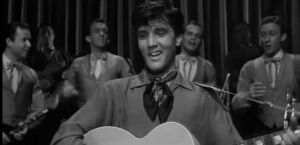Introduction
In the realm of rock ‘n’ roll, Elvis Presley’s “King Creole” stands as a masterpiece—a cinematic rock ‘n’ roll tale that encapsulates rhythmic rebellion and the iconic vocal prowess of the King. This timeless track is not just a song; it’s a rhythmic journey that transcends time, carrying with it the rebellion expressed in Elvis’s vocals and the unforgettable cinematic experience found in each note. Join us as we unwrap the rhythmic rebellion, delve into the emotional resonance, and explore the enduring appeal of “King Creole.”
Unveiling “King Creole”
“King Creole” stands as a testament to Elvis Presley’s ability to convey deep emotions through music. This cinematic rock ‘n’ roll tale is more than just a tune; it’s a rhythmic journey that transcends time, carrying with it the rebellion expressed in Elvis’s vocals and the timeless expression of rock ‘n’ roll found in its electrifying beats.
Elvis’s Rhythmic Rebellion
Elvis’s rendition of “King Creole” is a rhythmic rebellion—an exploration of cinematic rock ‘n’ roll that showcases his vocal mastery. The rebellious track transforms into an iconic musical tale, inviting listeners to immerse themselves in the emotional depth of Elvis’s musical expression.
Iconic Rock ‘n’ Roll Tale
Released during a period of musical evolution, “King Creole” became synonymous with an iconic rock ‘n’ roll tale. The pulsating rhythm, coupled with Elvis Presley’s distinctive vocals, transports listeners to a time when music was a rebellious force, and the King was its charismatic leader.
Cinematic Rock and Emotional Resonance
The song’s cinematic rock is elevated by Elvis’s emotional resonance. Every note and lyric contribute to a sense of rebellion and freedom, making “King Creole” a timeless expression of rock ‘n’ roll that resonates with anyone who has felt the power of music as a form of rebellion.
